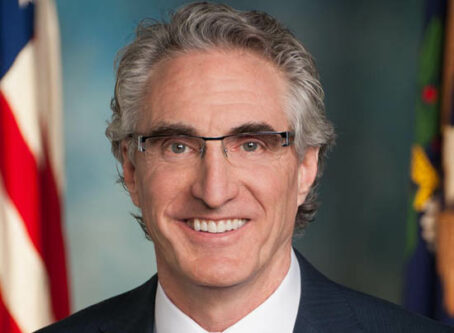Northeast lawmakers urge governors to sign Transportation and Climate Initiative
More than 100 lawmakers in the Northeast are expressing support for the Transportation and Climate Initiative in a regional letter to their respective governors, the latest push to move towards electric vehicles.
During a recent news conference for Elected Officials to Protect America, five lawmakers from Rhode Island, Massachusetts and Connecticut fielded questions about the Transportation and Climate initiative within their respective state and region. More than 120 members of Elected Officials to Protect America, which includes local and state governments, signed a regional letter urging governors and legislatures to sign the climate initiative into law.
The Transportation and Climate Initiative Program requires large gasoline and diesel suppliers to buy what are called allowances in a cap-and-invest plan.
Essentially, companies will be limited to how much carbon dioxide can be emitted. After reaching its cap, a company can pay the government a certain amount of money to go beyond that limit. The number of allowances a company can purchase will decline each year.
Last December, governors of all three states and the mayor of Washington, D.C., signed a memorandum of understanding stating they will be the first to launch the Transportation and Climate Initiative program. However, that MOU is nonbinding.
Now, lawmakers in the region want governors to ratify the initiative. State and local lawmakers who attended the Elected Officials to Protect America news conference claim that without the Transportation and Climate Initiative in full force, their respective states will not be able to afford to take advantage of federal programs addressing transportation and climate change.
In anticipation of a federal infrastructure bill, policymakers will finally get much needed financial help with certain projects. However, federal programs require states to match a certain percentage of the funding. With revenue generated from the Transportation and Climate Initiative, states will be in a position to chip in their share. Without it, some states may see those opportunities pass by to states that can afford it.
Rhode Island
Representing Rhode Island, state Sen. Meghan Kallman is going for a second attempt at passing legislation that makes the Transportation and Climate Initiative legally binding.
Earlier this year, the Rhode Island Senate passed bill S872 with a 38-7 vote. That bill would sign the climate initiative into state law. However, the bill was sent to the House Finance Committee where it sat in limbo when the legislative session ended on June 30. Sen. Kallman, who co-sponsored S872, said she will try again when the next session begins on Jan. 5.
However, Rhode Island has been successful in passing other legislation dealing with climate change. In April, Gov. Daniel McKee signed the Act on Climate into law. The bill updates the Resilient Rhode Island Act of 2014. Specifically, the state will reduce greenhouse gas emissions to 10% below 1990 levels by the end of this year, 45% below 1990 levels by 2030, 80% below 1990 levels by 2040 and net-zero emissions by 2050.
Rhode Island has also been a participating state in the Regional Greenhouse Gas Initiative since 2009. That initiative is the nation’s first market-based regulatory program to reduce carbon dioxide emissions from power plants.
Similar to the Transportation and Climate Initiative, the Regional Greenhouse Gas Initiative establishes a regional cap on CO2 emissions from the power sector. Regulated sources must possess a tradable CO2 allowance for each ton of CO2 they emit. Companies can acquire allowences through quarterly regional auctions and the secondary market. Proceeds go towards clean energy, energy efficiency programs and renewable energy.
Connecticut
While Connecticut has made steps toward addressing climate change, some state lawmakers do not feel it has done enough.
State Sen. William Haskell lauded Rhode Island’s ability to pass meaningful legislation like the aforementioned Act on Climate. He would like to see his state do something similar, including ratifying the Transportation and Climate Initiative.
“I think we do a really good job here in Connecticut of setting lofty ambitions,” Haskell said during the news conference. “We did this just a few years ago saying that Connecticut had to reduce our carbon emissions by 45% below 2001 levels by 2030. Where we’re not so good is giving policymakers the tools to actualize those goals.”
Because of that, Haskell said, the state is nowhere near its goal, currently hovering at 17% reduction in emissions.
Haskell argues that the Transportation and Climate Initiative puts those who benefit from carbon emissions on the hook to foot the bill. The senator also referred to the Regional Greenhouse Gas Initiative as proof that the state can launch a cap-and-invest program. Nearly a dozen states participate in that initiative, which has generated more than $4 billion.
Shortly before the Rhode Island Senate passed its attempt to ratify the Transportation and Climate Initiative, Connecticut Gov. Ned Lamont said he will not be including it in his budget proposal.
Massachusetts
The lone representative for Massachusetts, Newton City Councilor Emily Norton provided a local government perspective on the Transportation and Climate Initiative.
Norton said that local governments make decisions that affect our daily lives, including policies on schools, roads, etc. However, local governments in Massachusetts have a funding hurdle to clear. Specifically, local governments in the state cannot levy taxes like a local fuel tax. Consequently, creating a funding mechanism for local governments can be difficult.
Furthermore, broad state authority prevents cities from enforcing gas utilities to fix a leak on their roads, Norton said. With those obstacles in mind, the Transportation and Climate Initiative can provide funding that local governments could otherwise not obtain.
Unlike Connecticut and Rhode Island, Massachusetts does not need legislative approval to implement the Transportation and Climate Initiative.
The Global Warming Solutions Act of 2008 allows the state to reach emissions standards by permitting the state Department of Environmental Protection to “promulgate rules and regulations” that will effectuate those goals.
The Transportation and Climate Initiative requires at least three jurisdictions to ratify the program before it can go into effect. Although Massachusetts can pull that trigger whenever it wants, it still has to wait for Connecticut and Rhode Island to sign the initiative into law. Despite a Democrat majority in the general assembly and governor’s office, that has proven to be an uphill battle. LL









